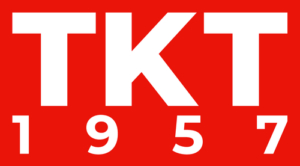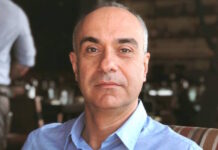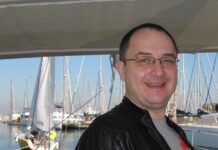Interview with Rami Goldberg, VP sales EMEA at iKO Media Group.
When were you born? Who are your parents?
I was born in Leningrad (St Petersburg), in 1977. At the age of 12, my family took me to Israel. They studied at the Leningrad Civil Engineering University. Then, they changed their jobs to keep making money. In those years it was not easy, everyone was starting to do their own thing. My dad opened a small business, and my mother worked as a hairdresser.
Let’s start with St Petersburg. What school did you go to? Was it a simple school or a specialized one?
I don’t really remember much about it, but it was a just normal school. But I remember well that my grandparents were teachers. My grandfather taught at a technical school, and my grandmother was an English teacher. Every summer they sent us to lessons so we knew up to six months of content in advance. So, I would come to school and just sit around and do nothing for six months. This experience definitely shaped me.
Did you come to Israel with your entire family or did your grandparents stay back?
We all came together – my grandparents, our family, and the family of my father’s brother. When we arrived, there were 11 of us.
Where did you go first, which city?
We arrived in the city of Petah Tikva. After a year, my grandparents received a government apartment, and we moved to a small town near Ashdod. We lived there until everyone scrambled out. So, that’s how we built our life.
Did you attend an Ulpan first, or did you go straight to school?
When we were 12 years old, my two cousins and I would take a taxi to Tel Aviv, to the Ulpan. I remember, one of my cousins and I really wanted to take the Mercedes, because a lot of the taxis were Mercedes. When you’re twelve and you see one of those long taxi Mercedes for the first time, you think it’s a limousine! It wasn’t as cool if a Ford came to pick you up. We counted how many times all of us had been on a Mercedes – this was a very emigrant thing. On Fridays, we went to school. There wasn’t a single Russian speaker, so it wasn’t easy.
At the age of 12, children start to become aggressive, this is the beginning of a transitional age …
There were both good and bad moments. There were issues, especially because no one spoke a language we understood. I would not say that there was a ‘black line’, but there definitely were moments when I had to stand up for myself. At 14 I went to the naval school, and studied there for five years.
For repatriates, it is very expensive to send children to school in taxis. How did your family afford this?
They were kind of like route taxis! There were Ford and Mercedes minivans that could fit about eight people, working like minibuses. It wasn’t expensive, I don’t remember how much it was exactly. When we came to Israel, we had 300 dollars, because you weren’t allowed to take anything out of the country.
Did you manage to sell your apartment when you left?
This was in 1989. We had a cooperative apartment, which we sold, but could not bring the money. We also paid for renouncing our citizenship, because at the time you had to pay for that.
Why did you go to naval school?
My father suggested it. He wanted to transfer me to a school that would have some kind of future for me, like a profession. So, I studied to be an electrician there, I even have a professional certificate. I walked around in uniform for four years, lived in a boarding school and came home once every two weeks. That hardened me well.
Where was this nautical school?
In Ashdod, not far from home, but I still only saw my parents once every two weeks.
Were conditions tougher there than in a regular school?
Yeah, you had everything – a uniform, morning lineups. Also , all kinds of checks – how you shaved, how you cleaned your shoes, how you wore your uniform. It was very military.
After that, were you supposed to go to the army?
Yes, after that I ended up in the army for four years, in the fleet. I served on naval ships, then I was an instructor and worked with the young people. Then I served on a submarine for a year and a half. After that I got tired of the uniform, and I decided I wanted to live a free life.
Is the compulsory service in Israel three or four years?
Three years. I served four and a half. I added a year and a half, because I went to serve on a submarine under a contract.
You were already 22 years old, and starting life almost over again.
Exactly. I no longer wanted to do anything related to electrics, not even anything close. I spent eight months in the States, in New York. I wanted to test my luck, as you say. I tried lots of different jobs, but I realised that I didn’t want to just be a worker. So, I went back to Israel.
I’ve always worked and earnt my own money – I saved up for my licence myself, for example. I helped my parents too, because it was difficult. I remember the difficult financial periods we went through, especially because we were repatriates. We couldn’t bring anything, so we had to build up from scratch.
What did you do to save up for your driver’s license?
I worked every summer, during the holidays. Once I worked in a store, cleaning the fish. I would come home smelling so bad my mother would make me change even before I came into the house! I remember, it was an awful store, but I earned a lot. Once I changed the bulbs on the street lights. When the first cable systems were installed, they would install the pipes to put down the cable, and I worked on that. I really did everything.
When I got back from the US, I started working as a security guard. I would go between sites where the alarm would go off, I guarded the objects. A year after I worked there, I went to university, and I was looking for a job that would fit my schedule.
Which university did you go to?
In Beersheba, but not at all for my specialisation – I focused on Behaviour and Human Resources. I actually wanted to go into this field, working directly with recruiting, conducting interviews, etc.
I was a full time-student, and I worked nights and weekends. I went to Beersheba two or three times a week, and I worked in the playout. I paid for my whole education myself.
How long did your university studies take?
In theory, it was supposed to be three, but I finished in four because I had to work in parallel. About a year and a half after the start of my studies, I rented an apartment and moved out of my parents’ house. So, I started my independent life.
What was your job exactly?
There was a big playout, and I started “from scratch”, as you say. You would put the cassette in, check that everything was working fine. I really started from the bottom.
So essentially you were working as a video engineer?
I don’t know what it’s called. Probably not even a video engineer. You sit there, and you have four Betacams, each with a cassette. You insert it all into the system, then check that everything is fine. I would just do this for eight hours a night.
In about a year or six months – you get to move up. You are now sitting in front of playlists, there are eight channels that you’re responsible for. You check the lists to make sure you have everything, and you monitor it. You say what you are missing, and the guys prepare the material for you.
After about four years of studying, I was already in charge of the entire playout center. I was leading the shift. After my university I was in charge of the whole center, about 40 or 50 channels. So, I had to check that everything was working and everyone was ready, and lead the shift of 14 people.
How long did you work there?
At that first company, I was there for four years. After four years, I was deciding what to do. Then, a man from sales came to us with clients. He told me that he was there with an American client, and I need to show him the playout, because he himself didn’t really understand it. So, I led that potential client around for 15 minutes, explaining everything to him.
A day later he comes to me and asks if I had ever thought about working in sales. I told him – honestly, no. He said that if I wanted to earn some more money I could go try sales with them. I went home and started thinking about what to do – I had studied for four years, am I going to change my profession now? In three days, my wife (who was my girlfriend at the time) told me to follow my heart. From then on I worked in sales for eight years, selling the services of that company I was already working for. I started from playouts and went up from there. So, there, that’s how it happened.
That company was then acquired by a German one, and I got offered a job at another company. I realised that I didn’t want to continue in this field – there was no professional growth. So, this is how I ended up in IKO Media Group. That was four years ago, at the end of 2016. I eventually became the VP of sales.
Is this an Israeli-Swiss company ?
It is a Swiss company, but there are Israelis, Italians, Indians, etc, working in it too.
Where is the head office of the company?
The official head office is in Switzerland, but everything involving operations and equipment is in Rome, Italy
Are the sales spread out around the world?
Yeah, they’re scattered. I am located between Israel and Rome, but obviously with the pandemic it’s a little different. There’s also sales between Israel and Paris. Today, someone working in sales needs a computer, internet, and a phone. Physically, you have to be everywhere – you have to fly, to meet, etc.
Did you come to this company when it had just been created?
Yes, it was just created. I was one of the first to join.
Were you the one forming a sales force, or did you choose a different tactic?
The company was new, so everyone made an effort. People used all of their connections – someone had supplies, someone had satellite organisations, some people had clientele. We built everything from scratch.
Right now, after four years, IKO Media Group broadcasts about 220 TV channels globally, and the company has a yearly turnover of about 30 million dollars. This is what we built in four years. I think that this has been very successful, and I’m incredibly glad to be a part of this project.
How did the company survive the first year of the pandemic?
Honestly, everyone expected it to end quickly. People thought, February will pass, summer will come, and everything will be over. We, like many others, believed that this would be a ‘transitional phase’, since no one fully knew what we were dealing with.
As a company, we are very fortunate to have a stable clientele and a good backlog. We have rather long contracts, and we do not work with instant or short-term sales. We have service orders, which are designed for two or three years in advance, so the company suffered mainly in the sphere of “occasional news”, like sports. This is very developed in our company. But because there was no sport, we saw a huge loss there. Suddenly, from a million dollars there were zero – that was definitely felt in the company.
In everything relating to ‘24/7’, so services that are stable, there were fairly minimal losses. However, if you look a little further, we see that clients this year were very careful in approaching future contracts and projects. Everyone was afraid to make plans for the future. So it was hard to find new business, Everyone wanted to economise and preserve what they had, so this affected us too.
With the arrival of 5G, new methods of delivery and distributions, where does your company see itself in this changing world? You had a good start, but times are changing, as are technologies.
We are a service provider, this currently gives the opportunity for those with their own convent to get it to the viewer. We are in the field of technology OTT, playout, origination of content. Everything is done at the request and needs of our clients. If we find ourselves needing to expand our portfolio and our services, then we, as a service provider, will do it. We are not afraid of 5G, it will be part of our world soon. Of course, there will be shifts , but we are here to do playout, we know video, and we work with TV channels. We will be happy to present our services in this area, too, because even there they will need people who know how to work with video programs that will do the distribution, broadcast, and so on. Sports will still happen, news channels will still be around, 4K is still here too.
I think that this transition will be more of an ‘addition’, some will turn to 5G, some to OTT. But there is enough to go around. I don’t know what will be in 50 years, but I don’t see Gazprom Space systems or RSCC cancelling their satellites and turning them off in the near future. I think for this century it should be fine. Of course, we need to make changes in line with the evolution. I am not a satellite operator. I sell a service, which implies a more holistic approach. This is my personal view – not as a company. So, I am not afraid of innovations, I boldly look to the future and accept them.
How did the playout direction appear in the company, and what services do you offer?
The pandemic has made it clear to everyone that everything that was happening a year ago has ‘receded’ into the background – no more morning cafe meetings or things like that. We can also see that there is a shift of services to the OpEx model. Companies of course want to sell their devices, but clients are understanding that the scheme now is ‘try and buy’, or ‘pay as you go’. I mean, our life is changing into a sort of Netflix style. Netflix made it clear to everyone that there was a new system and new concepts on the market. Therefore, to offer our customers the ability to make services and playout in the OpEx format, in a ‘pay as you go’ format is a great opportunity. It allows you not to invest huge amounts of money in public infrastructure, not have to worry about personnel and electricity expenses, and enables people who are engaged in content to use our services when necessary.
I believe that any TV company should deal with the sales and monetization of its content, and less so with technical issues and infrastructure. Their goal is to make good television, sell content, or influence the viewer. Everything that is related to technical infrastructure, I think, the world is going away from right now. We see this in Amazon Web Services, we see it in expanding opportunities of working from home. Everything works on mobile devices. We think that this is the next step, so eventually everything will move towards this. This is my personal opinion, and the outlook of our company.
That is, you think that the strategic direction is the transition of small and medium-sized companies to outsourcing to companies that provide playout?
Yes, I think this is the most correct strategic step. Maintaining a technical department is expensive. It’s not just about buying a server, how much does it cost to keep and maintain it?
You mentioned earlier about consulting with your girlfriend at the time. What was her job? She encouraged you to take a big risk that could have backfired.
Yes, we were a very young couple. She works as a teacher with deaf-mute children. At that time she was just starting out, so she didn’t have a big salary. But, as they say, if you don’t take risks you don’t drink champagne.
When did you get married?
We got married 11 years ago.
Does your wife still work as a teacher?
She continues to work as a teacher today. Of course she has advanced, her salary is higher now, but yes, she works in the same field. She supported me, and I went ahead with it because I felt her support, the ‘wind in my sales’. I believe that I have found exactly what I want to do. I really like my job, I love it a lot.
Of course, like everyone, I have my moments where I don’t want to get up and just want to stay in bed, but I think this happens to people in every type of work. But when I look at my life, I am very content.
Do you have children?
Yes, I have two children. My daughter is nine and a half years old, and my son is four and a half.
What do you consider to be your main merit in your professional career so far? What are you most proud of?
I will not name the client, but one of my clients that I have had success with, I consider to be my biggest achievement. This is one of our most strategic accounts. After three or four years of trying to work with them, I finally succeeded. I never stopped believing, didn’t stop working. I worked towards my goal and achieved it. I think that my work with my clients and my partners is very important for me, personally. I have a very personal approach to my clients, and I try to be the ‘face’ of the company. I present the full picture so that it will be easier for them to work with the entire company.























